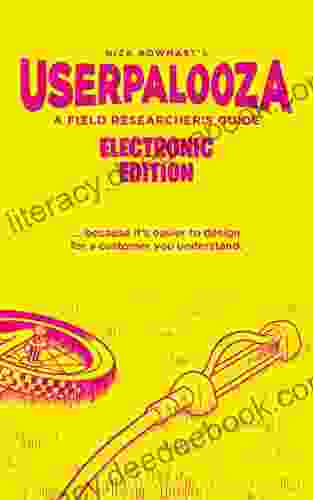The Ultimate Guide to Userpalooza Field Researcher Guide

Userpalooza is a powerful tool for gathering user insights and feedback. By conducting field research, you can gain a deep understanding of your users' needs, wants, and motivations. This information can be used to improve your products or services, create more effective marketing campaigns, and make better business decisions. This guide will provide you with everything you need to know to conduct effective Userpalooza field research. We will cover the following topics: * Planning your research * Recruiting participants * Conducting interviews * Analyzing your data * Reporting your findings <h2>Planning Your Research</h2> The first step in conducting Userpalooza field research is to plan your research. This involves defining your research objectives, developing a research plan, and creating a timeline. <h3>Define Your Research Objectives</h3> The first step in planning your research is to define your research objectives. What do you want to learn from your research? What questions do you need to answer? Your research objectives should be specific, measurable, achievable, relevant, and time-bound (SMART). For example, you might want to: * Learn how users interact with your product * Understand the motivations and pain points of your users * Get feedback on a new feature or product idea <h3>Develop a Research Plan</h3> Once you have defined your research objectives, you need to develop a research plan. This plan should outline the methods you will use to collect data, the participants you will recruit, and the timeline for your research. The following are some of the most common methods for collecting data in Userpalooza field research: * **Interviews:** Interviews are a great way to get in-depth feedback from users. You can ask open-ended questions to explore their thoughts and feelings, and you can also use probes to get more specific information. * **Observations:** Observations are a good way to see how users interact with your product or service in real-world settings. You can observe users as they use your product, or you can observe them in their natural environment. * **Surveys:** Surveys are a good way to collect quantitative data from a large number of users. You can use surveys to ask users about their demographics, their usage habits, and their satisfaction with your product or service. When developing your research plan, you need to consider the following factors: * **The time you have available:** How much time do you have to conduct your research? * **The budget you have available:** How much money do you have to spend on your research? * **The resources you have available:** What resources do you have access to, such as personnel, equipment, and software? <h3>Create a Timeline</h3> Once you have developed a research plan, you need to create a timeline for your research. This timeline should include deadlines for each stage of your research, such as recruiting participants, conducting interviews, and analyzing your data. <h2>Recruiting Participants</h2> The next step in conducting Userpalooza field research is to recruit participants. The participants you recruit should be representative of your target audience. For example, if you are researching a new product for young adults, you would want to recruit participants who are between the ages of 18 and 24. There are a number of ways to recruit participants for Userpalooza field research. You can use social media, email marketing, or paid advertising to reach potential participants. You can also partner with other organizations or businesses to recruit participants. When recruiting participants, it is important to be clear about the purpose of your research and the time commitment involved. You should also offer incentives to participants for their time. <h2>Conducting Interviews</h2> Interviews are a great way to get in-depth feedback from users. When conducting interviews, it is important to be prepared and to ask open-ended questions. You should also use probes to get more specific information. Here are some tips for conducting effective interviews: * **Be prepared:** Before you conduct an interview, take some time to prepare. This includes ng research on the participant, reviewing the research plan, and preparing questions. * **Be respectful:** When conducting an interview, it is important to be respectful of the participant's time and privacy. You should also be mindful of their body language and tone of voice. * **Ask open-ended questions:** Open-ended questions allow participants to provide more detailed answers. For example, instead of asking "Do you like this product?", you could ask "What do you like or dislike about this product?" * **Use probes:** Probes are questions that you can use to get more specific information from participants. For example, if a participant says that they like a particular feature, you could ask "What do you like about that feature?" * **Take notes:** It is important to take notes during interviews. This will help you to remember what the participant said and to identify key themes. <h2>Analyzing Your Data</h2> Once you have collected your data, you need to analyze it to identify key themes and insights. The following are some of the most common methods for analyzing qualitative data: * **Content analysis:** Content analysis is a method for analyzing the content of text data. You can use content analysis to identify key themes, patterns, and relationships. * **Thematic analysis:** Thematic analysis is a method for analyzing qualitative data that focuses on identifying recurring themes. * **Discourse analysis:** Discourse analysis is a method for analyzing qualitative data that focuses on the way that people use language. When analyzing your data, it is important to be objective and to avoid bias. You should also triangulate your data by using multiple methods to collect data and by getting feedback from other researchers. <h2>Reporting Your Findings</h2> Once you have analyzed your data, you need to report your findings to your stakeholders. Your report should be clear, concise, and actionable. It should also include recommendations for how to improve your product or service. Here are some tips for reporting your findings: * **Use clear and concise language:** Your report should be easy to read and understand. Avoid using jargon and technical terms. * **Be objective:** Your report should be objective and unbiased. You should present your findings in a fair and balanced way. * **Provide actionable recommendations:** Your report should include actionable recommendations for how to improve your product or service. * **Get feedback from others:** Before finalizing your report, get feedback from other researchers and stakeholders. This will help you to ensure that your report is clear, concise, and actionable. Userpalooza field research is a powerful tool for gathering user insights and feedback. By following the steps outlined in this guide, you can conduct effective research that will help you to improve your products or services, create more effective marketing campaigns, and make better business decisions.4.3 out of 5
| Language | : | English |
| File size | : | 7783 KB |
| Text-to-Speech | : | Enabled |
| Enhanced typesetting | : | Enabled |
| Word Wise | : | Enabled |
| Print length | : | 168 pages |
| Lending | : | Enabled |
| Screen Reader | : | Supported |
Do you want to contribute by writing guest posts on this blog?
Please contact us and send us a resume of previous articles that you have written.
 Book
Book Novel
Novel Page
Page Chapter
Chapter Genre
Genre Reader
Reader Library
Library Paperback
Paperback Magazine
Magazine Sentence
Sentence Bookmark
Bookmark Shelf
Shelf Glossary
Glossary Foreword
Foreword Bestseller
Bestseller Library card
Library card Narrative
Narrative Reference
Reference Encyclopedia
Encyclopedia Thesaurus
Thesaurus Character
Character Resolution
Resolution Catalog
Catalog Borrowing
Borrowing Stacks
Stacks Study
Study Research
Research Lending
Lending Reserve
Reserve Journals
Journals Reading Room
Reading Room Rare Books
Rare Books Special Collections
Special Collections Literacy
Literacy Study Group
Study Group Thesis
Thesis Dissertation
Dissertation Storytelling
Storytelling Awards
Awards Theory
Theory John Broven
John Broven A Taylan Cemgil
A Taylan Cemgil Barbara Martin Stephens
Barbara Martin Stephens Paul G Walmsley
Paul G Walmsley Rashelle Workman
Rashelle Workman Lynne A Weikart
Lynne A Weikart Mrs Henry Wood
Mrs Henry Wood Amy Brooks
Amy Brooks David Nunan
David Nunan Daniel G Newman
Daniel G Newman Perrine Toledano
Perrine Toledano D Ray Freeman
D Ray Freeman John Basil
John Basil Rick Wormeli
Rick Wormeli Edward Klorman
Edward Klorman Sophie Claire
Sophie Claire Galsan Tschinag
Galsan Tschinag Thomas F Brier Jr
Thomas F Brier Jr Alesha Dixon
Alesha Dixon Dennison Berwick
Dennison Berwick
Light bulbAdvertise smarter! Our strategic ad space ensures maximum exposure. Reserve your spot today!

 Christian CarterHow Political Parties Respond to Citizen Concerns: A Comprehensive Analysis
Christian CarterHow Political Parties Respond to Citizen Concerns: A Comprehensive Analysis
 Quentin PowellUnveiling the Hilarious Intrigues and Enduring Charm of Shakespeare's "The...
Quentin PowellUnveiling the Hilarious Intrigues and Enduring Charm of Shakespeare's "The... Brady MitchellFollow ·16.2k
Brady MitchellFollow ·16.2k Roy BellFollow ·14.2k
Roy BellFollow ·14.2k José SaramagoFollow ·8.4k
José SaramagoFollow ·8.4k Cody RussellFollow ·2.1k
Cody RussellFollow ·2.1k Scott ParkerFollow ·17.6k
Scott ParkerFollow ·17.6k Preston SimmonsFollow ·7.9k
Preston SimmonsFollow ·7.9k Jorge AmadoFollow ·16.1k
Jorge AmadoFollow ·16.1k Edwin BlairFollow ·15.7k
Edwin BlairFollow ·15.7k

 Al Foster
Al FosterHow To Breathe Underwater: Unlocking the Secrets of...
: Embracing the...

 Ian Mitchell
Ian MitchellThe Laws of Gravity: A Literary Journey into the...
Lisa Ann Gallagher's...

 Francis Turner
Francis TurnerChristmas Solos For Beginning Viola: A Detailed Guide for...
Christmas is a time for...

 Jamal Blair
Jamal BlairDefine Humanistic Psychology Forms Of Communication...
Humanistic...

 Morris Carter
Morris CarterJudgment in Berlin: Unraveling the Intrigue of an...
"Judgment in Berlin" is a gripping...
4.3 out of 5
| Language | : | English |
| File size | : | 7783 KB |
| Text-to-Speech | : | Enabled |
| Enhanced typesetting | : | Enabled |
| Word Wise | : | Enabled |
| Print length | : | 168 pages |
| Lending | : | Enabled |
| Screen Reader | : | Supported |









